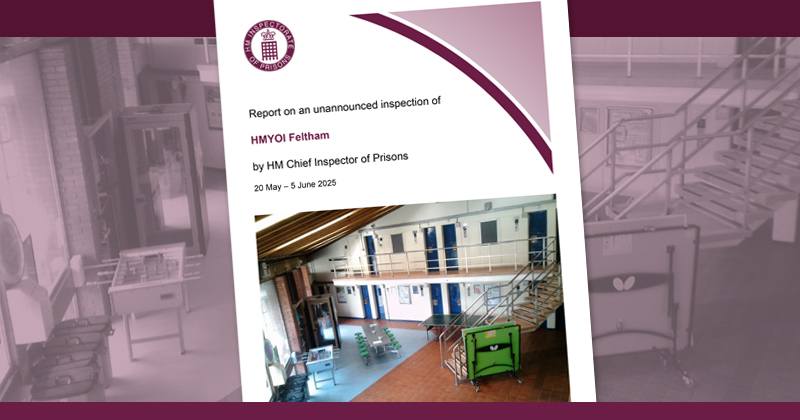The chief prisons inspector has warned of a “bleak existence” for boys at a young offender institute in West London due to poor education attendance, high levels of violence and staff shortages.
Young Offender Institute Feltham A, which houses up to 140 children and young men aged between 15 and 18 years old, was found to be “poor” at ensuring purposeful activity during an unannounced inspection between May and June this year.
Chief inspector of prisons Charlie Taylor reports “frustration” among both staff and boys at short notice cancellations to lessons and other activities, with a “completely unacceptable” four hours planned outside of cells each day.
He wrote: “Those on the enhanced units could be expected to be out for much longer, but others described a bleak existence with many hours spent watching daytime television in enforced idleness.”
The institute’s levels of violence are the highest of any prison in England – with 253 assaults on children in the last 12 months – contributing to “unpredictable” staffing levels with sickness rates “among the highest” in the country, the inspection found.
Taylor said inspectors have “cautious optimism” that the institute will improve, a year after he warned of significantly deteriorating levels of self-harm and violence and five months after interim governor Gary Sillifant was appointed.
Although Ofsted, which also attended the inspection, was “positive” about the quality of some of the teaching, their overall grade remains ‘inadequate’ due to poor behaviour and leadership and management of the education service.
Attendance was “very poor” at a rate which would “never have been acceptable” at school or college, said the chief inspector.
Missing out on learning
Last year, Ofsted’s chief inspector Sir Martyn Oliver said England’s prison service is failing children held in England’s four young offender institutes.
The education inspectorate’s report found that “severe” staff shortages mean 15- to 18-year-olds are spending only 10 to 13 hours in education each week, in breach of their legal right to at least 15 hours.
Data collected by the Howard League for Penal Reform shows that between January 2024 and February this year, average education at Feltham plummeted to a low of 1.5 hours per week last August, with a high of just 12.1 hours.
A spokesperson for the Prison Education Trust said: “Staff shortages, and broader challenges like overcrowding, have a significant impact on the delivery of education.
“The government must address these and put right the severe underfunding of education across the estate to give children – and adults – the opportunity to gain the skills they need to thrive on release.”
What is Feltham?
Feltham A is one of three young offender institutions in England, holding about a quarter of the approximately 400 under-18s held in custody in England and Wales.
It was founded in 1910 as the second of England’s infamous “Borstal” institutions.
Despite a rebuild, completed in 1988, that reinvented the site as a collection of small triangular housing units in the 1980s, it has continued to hold a fearsome reputation and has frequently been highlighted as a concern by inspectors.
The closure of the fourth young institute Cookham Wood, in May last year, caused Feltham’s population to surge by 50 per cent, contributing to a “vicious cycle” of violence, the inspectorate found in a follow up visit last year.
‘Priority Concerns’
One of the “priority concerns” for inspectors is the failure to provide education to children in custody which “significantly limited their chances of finding work and making a positive contribution to the community” on release.
Managers are also failing to provide sufficient vocational training or provide basic reading support or access to the library, which is “well-run”.
Ofsted found that most children only received half their allotted minimum of 18 hours per week in lessons for reasons “outside” of their control.
A third of planned attendances did not take place at all, often because escorts to lessons were “disrupted”.
However, managers at The Shaw Trust, which delivers the education and vocational training, planned teaching “purposefully”, supplied “well-qualified and experienced” teachers and built the knowledge and skills of the “small number of children attending regularly”.
Children’s Commissioner Dame Rachel de Souza said: “Feltham’s most recent report shows some promising signs in relation to the education provided, but conditions for the children living there remain of deep concern.
“Education is one of the most powerful tools we have for changing lives, offering stability and unlocking opportunities.
“For children in custody, it must be at the heart of rehabilitation, giving them a real chance to rebuild their lives and promote a future away from reoffending.”
Andrea Coomber, chief executive of the Howard League for Penal Reform, added: “High rates of use of force, scant education, and regimes compromised by chronic staff sickness that leave children trapped routinely inside their cells for 20 hours per day.
“This is the toxic backdrop against which we should analyse the terrible levels of violence inside Feltham and the short-sighted decision to introduce PAVA, a pain-inducing chemical irritant spray that is classified as a prohibited weapon under the Firearms Act 1968.”
A Ministry of Justice spokesperson said: “We are pleased this report recognises signs of improvement under new leadership, with Ofsted positive about the quality of teaching, but we know there is more to do.
“That’s why we’ve put in place new measures aimed at reducing violence and substance misuse, while also bolstering the education on offer to support rehabilitation.”
A spokesperson at the Shaw Trust said they were unable to comment.
















Your thoughts